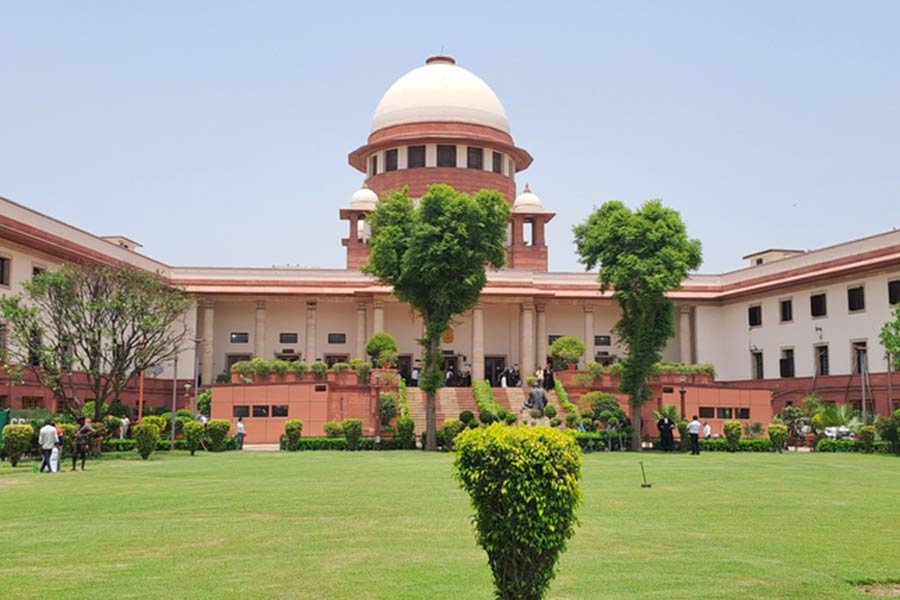The Supreme Court on Wednesday said “the chilling sight” of a bulldozer demolishing a building reminded one of a “lawless state of affairs” where “might is right” and that such “excesses” at the hands of the executive would have to be curbed with the “heavy hand of the law”.
“Our constitutional ethos and values would not permit any such abuse of power and such misadventures cannot be tolerated by the court of law… such an action also cannot be done in respect of a person who is convicted of an offence. Even in the case of such a person, the property/properties cannot be demolished without following the due process as prescribed by law,” a bench of Justices B.R. Gavai and K.V. Viswanathan said in a judgment.
The court said such an action by the executive would be wholly arbitrary and an abuse of the process of law.
The Uttar Pradesh government helmed by Yogi Adityanath, who earned the monicker “Bulldozer Baba” for allegedly targeting the houses of critics and minority community members, hailed the Supreme Court’s verdict and said it would help curb organised crime. The same bulldozer model has been replicated in several BJP-ruled states.
The Opposition parties hoped that the verdict would end “bulldozer terror” and “jungle raj” in Uttar Pradesh.
Clarifying that the Uttar Pradesh government was not involved in the case, a state government spokesperson said the verdict was part of the Jamiat Ulema-e-Hind vs North Delhi Municipal Corporation and Others case.
Justice Gavai, who authored the judgment, said the demolished houses were not only inhabited by the accused but also their spouse, children and parents.
“Can they be penalised by demolishing the property without them even being involved in any crime only on the basis of them being related to an alleged accused person? What is their mistake if their relative is arrayed as an accused in some complaint or FIR?”
“As is well known, a pious father may have a recalcitrant son and vice versa. Punishing such persons who have no connection with the crime by demolishing the house where they live in or properties owned by them is nothing but an anarchy and would amount to a violation of the right to life guaranteed under the Constitution,” Justice Gavai observed.
The bench held that the right to shelter was one of the facets of Article 21 (life and personal liberty) and depriving innocent people of their right by removing the shelter from their heads “would be wholly unconstitutional”.
Referring to the Centre’s arguments that in several cases the properties of the accused were included “by sheer coincidence” among the illegal properties that were demolished, the bench said: “When a particular structure is chosen all of a sudden for demolition and the rest of the similarly situated structures in the same vicinity are not even being touched, mala fide may loom large.”
“In such cases, where the authorities indulge in arbitrary pick and choose of the structures and it is established that soon before initiation of such an action an occupant of the structure was found to be involved in a criminal case, a presumption could be drawn that the real motive for such demolition proceedings was not the illegal structure but an action of penalising the accused without even trying him before the court of law,” the bench added.
Justice Gavai noted that there might be some unauthorised constructions where demolitions can be avoided against the payment of fines, while in some cases partial demolition was sufficient.
“In such cases, the extreme step of demolition of the property/house property would, in our view, be disproportionate… if demolition of a house is permitted wherein number of persons of a family or a few families reside only on the ground that one person residing in such a house is either an accused or convicted in the crime, it will amount to inflicting a collective punishment on the entire family or the families residing in such structure,” the bench observed.
The bench said incarcerated individuals — whether accused, undertrials, or convicts — had certain rights and could not be subjected to cruel or inhuman treatment.
“The right to a fair trial is essential in upholding the rule of law and protecting individual liberties. An accused cannot be declared guilty unless proven so beyond a reasonable doubt before a court of law. They cannot be declared guilty, unless there is a fair trial.
“If a citizen’s house is demolished merely because he is an accused or even for that matter a convict, that too without following the due process as prescribed by law… it will be totally unconstitutional… The executive cannot become a judge and decide that a person accused is guilty and, therefore, punish him by demolishing his residential/ commercial property/ properties. Such an act of the executive would be transgressing its limits,” Justice Gavai added.










